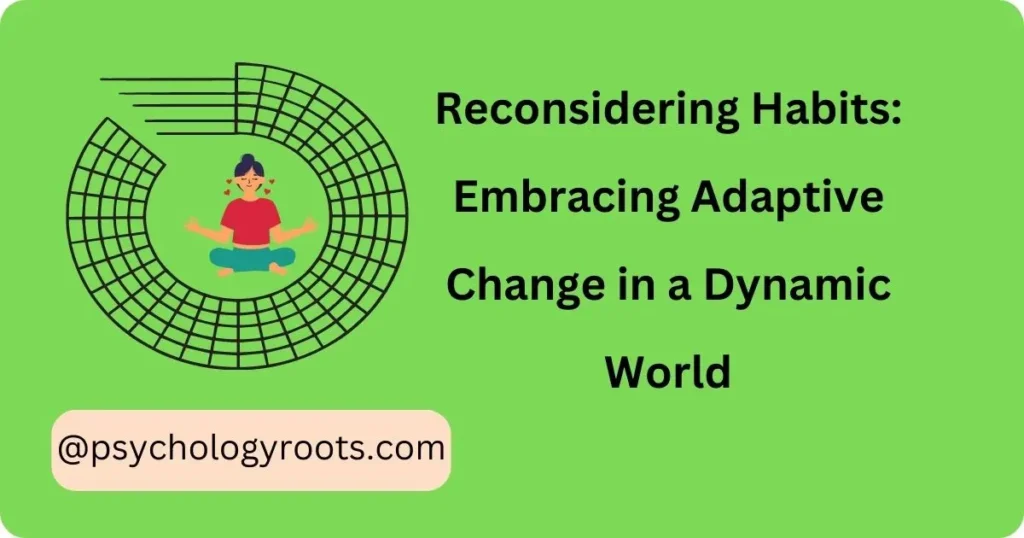Table of Contents
Reconsidering Habits: Embracing Adaptive Change in a Dynamic World
Here in this post, we are discussing “Reconsidering Habits: Embracing Adaptive Change in a Dynamic World”. You can read more about psychology-related material on our website. Keep visiting Psychology Roots.
Table of Contents
In the context of today’s rapidly changing world, it becomes imperative for us to reassess our habits and acknowledge that their drawbacks may not arise from inherent “badness” but rather from their outdated nature. Habits, once functional and adaptive, can now hinder our personal growth and well-being. By recognizing the necessity for evolution and embracing change, we can reconfigure our habits to serve as tools that align with our current goals and aspirations. This article delves into the concept of outdated habits and offers insights on how to approach them with a fresh perspective.

The Nature of Habits:
Habits are deeply ingrained patterns of behavior that gradually become automatic through repetition. Acting as cognitive shortcuts, they enable us to navigate daily life more efficiently. However, due to the ever-changing world we inhabit, habits that were once advantageous may no longer prove beneficial. Instead of categorizing such habits as “bad,” it is crucial to acknowledge their outdated nature and the need for revision.
Identifying Outdated Habits:
Recognizing outdated habits necessitates a mindful examination of our routines and behaviors. We can initiate this process by evaluating whether our habits align with our present goals, values, and circumstances. If we discern that a habit no longer contributes to our well-being or obstructs our progress, it indicates the requirement for an update.
Embracing Change:
Once we accept that our habits have become outdated, it becomes paramount to embrace change. Although change can be uncomfortable and challenging, it plays an integral role in personal growth. Rather than resisting change, adopting an attitude of curiosity and open-mindedness allows us to relinquish outdated patterns and develop new habits that align with our current needs and aspirations.
Shifting Perspectives:
To transform our outdated habits, a shift in perspective is essential. Instead of regarding habits as fixed and unchangeable entities, we must acknowledge their malleability. By cultivating a growth mindset, we empower ourselves to adapt and evolve our habits to suit our ever-evolving circumstances.
Implementing Positive Changes:
Replacing outdated habits with new ones is often a gradual process. Commence by identifying a habit you wish to alter and establish realistic goals. Breaking down the habit into smaller, manageable steps and celebrating milestones along the way facilitate progress. Surrounding oneself with a supportive environment and seeking accountability from friends or professionals can also contribute to the journey.
Cultivating Self-Compassion:
Changing habits can be challenging, and setbacks are inevitable. Hence, cultivating self-compassion throughout this process becomes vital. Rather than berating ourselves for occasional slip-ups, treating ourselves with kindness and understanding allows for a more effective transformation. It is crucial to remember that change is a journey, and each step, no matter how small, constitutes a valuable part of personal growth.
Conclusion:
Our habits are not intrinsically “bad,” but rather they may have become outdated. By recognizing the need for change and wholeheartedly embracing it, we can transform these habits to align with our current goals and aspirations. Shifting perspectives and cultivating self-compassion are integral components of this transformative process. By embracing the evolution of change, we embark on a healthy journey of personal growth and self-improvement.
Help Us Improve This Article
Have you discovered an inaccuracy? We put out great effort to give accurate and scientifically trustworthy information to our readers. Please notify us if you discover any typographical or grammatical errors.
Make a comment. We acknowledge and appreciate your efforts.
If you have any scale or any material related to psychology kindly share it with us at psychologyroots@gmail.com. We help others on behalf of you.